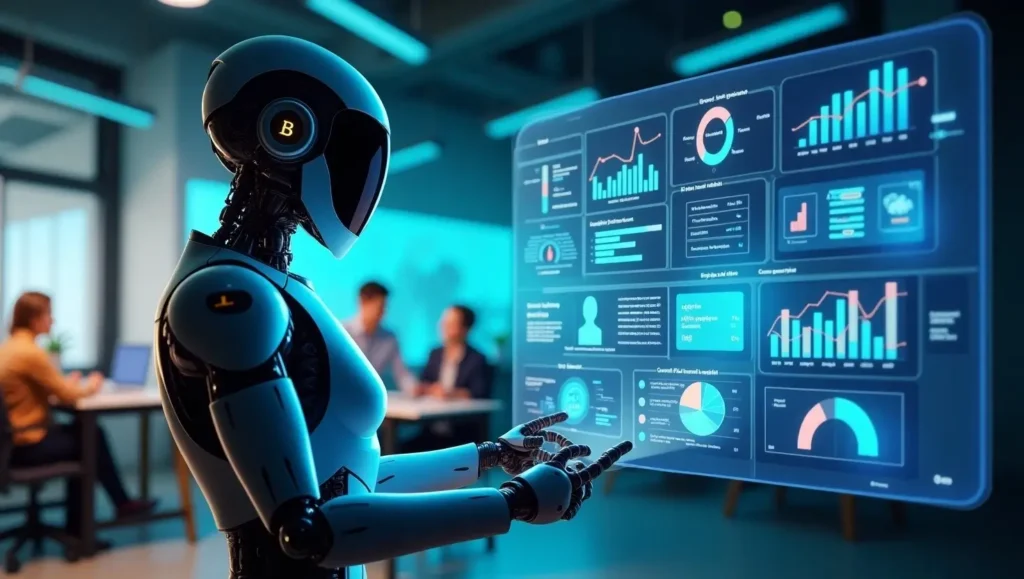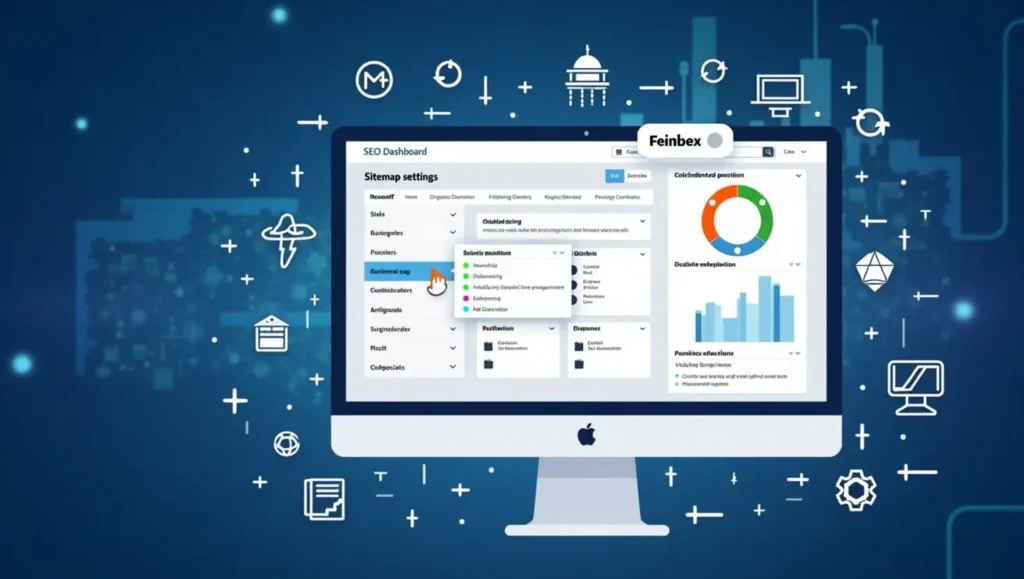Artificial intelligence, or AI, is at the front of the fast changing environment of digital marketing. . AI-powered SEO tools are revolutionizing the way businesses optimize their content, analyze competition, and scale agile solutions for growth. By leveraging AI, marketers can automate time-consuming tasks, enhance accuracy, and make data-driven decisions with greater efficiency.For a detailed list of the top AI SEO tools, check out our guide on Top 7 AI SEO Tools for Scaling Agile Solutions Like an Expert.
In this blog, we will explore the features and benefits of AI-powered SEO tools, how they contribute to scaling agile SEO strategies, and provide actionable insights for businesses looking to stay ahead of the competition.

Table of Contents
ToggleHow AI-Powered SEO Tools Align with Agile SEO Solutions
Agile SEO is a dynamic, iterative approach to search engine optimization that emphasizes adaptability, rapid experimentation, and data-driven improvements. AI-powered SEO tools enhance agile strategies by:
- Automating repetitive tasks such as keyword research and content optimization
- Providing predictive insights for faster decision-making
- Personalizing SEO strategies based on real-time data
- Improving efficiency through machine learning and natural language processing (NLP)
By integrating AI into SEO workflows, businesses can quickly adjust to search engine algorithm updates, track competitors effectively, and optimize their content at scale.
Key Features of AI-Powered SEO Tools
1. Advanced Keyword Research & Intent Analysis
AI tools analyze search intent beyond simple keyword volume, identifying user behaviors and trends. Tools like Surfer SEO and SEMrush use AI-driven insights to recommend the best keywords based on search patterns, competition, and relevance.
2. Content Optimization & Natural Language Processing (NLP)
AI-driven SEO tools, such as Clearscope and Frase, leverage NLP to analyze top-performing content and suggest improvements. They help marketers create content that aligns with search engine expectations and user intent.
3. Automated Technical SEO Audits
AI-powered audit tools like Screaming Frog SEO Spider and Sitebulb identify technical issues like broken links, duplicate content, and page speed problems, offering actionable recommendations for improvement.
4. AI-Powered Link Building & Backlink Analysis
AI tools such as Ahrefs and Moz streamline link-building strategies by identifying high-authority sites, analyzing backlink quality, and suggesting potential outreach opportunities.
5. Real-Time Rank Tracking & Predictive Analytics
AI-driven ranking tools, such as SERanking and Google Search Console Insights, offer real-time tracking and predictive analytics to help marketers anticipate ranking changes and adapt their strategies accordingly.
6. Voice Search & AI-Based Chatbot Integration
With the rise of voice search, AI SEO tools are now optimizing content for conversational queries. BrightEdge and MarketMuse use AI to tailor content for voice search and improve digital assistant interactions.
7. AI-Generated Content & Automated Insights
AI-driven content generators like Jasper and Copy.ai assist in crafting high-quality, SEO-friendly content based on user intent and current search trends, helping businesses maintain consistency and engagement.
Benefits of AI-Powered SEO Tools
1. Efficiency & Automation
AI reduces manual work by automating SEO processes, from keyword research to content creation, freeing up time for strategic planning.
2. Enhanced Data Accuracy
AI eliminates human errors in data analysis, ensuring more precise insights for decision-making. For technical SEO improvements, read Revolutionizing Technical SEO with AI: 7 Best Practices for 2025.
3. Faster & Smarter Decision-Making
Predictive analytics empower businesses to anticipate SEO trends, algorithm changes, and shifting user intent. For more on predictive strategies, explore 6 Predictive SEO Strategies Using AI to Dominate Future Rankings.
4. Scalability & Competitive Advantage
AI-driven SEO enables businesses to optimize content at scale, maintain a competitive edge, and stay ahead in search rankings. To learn how AI automates scaling, check out AI SEO Automation: Top Scaling Solutions to Dominate 2025.
5. Personalized User Experience
AI tools analyze user behavior to help create hyper-personalized content and search experiences, improving engagement and conversions. For agile SEO tactics, read Agile SEO in 2025: 8 Game-Changing Tactics for Rapid Growth.
6. Improved Technical SEO & Site Health
AI-powered audits ensure that technical SEO elements such as mobile-friendliness, crawlability, and page speed are optimized, enhancing overall website performance.
7. Cost-Effectiveness & ROI Maximization
By reducing the time and effort needed for manual SEO tasks, AI tools help businesses allocate resources efficiently, ultimately improving return on investment (ROI). For growth strategies, explore Unlock 10X SEO Growth: How AI-Powered Analytics is Changing the Game.

Actionable Insights: How to Implement AI SEO Tools
- Start with AI-Powered Keyword Research – Use tools like SEMrush or Ahrefs to identify search intent and trending topics.
- Optimize Content Using NLP – Leverage Clearscope or Frase to ensure content is well-structured and contextually relevant.
- Automate SEO Audits – Implement tools like Screaming Frog to identify and fix technical SEO issues.
- Leverage Predictive Analytics – Use AI-driven rank tracking tools to anticipate ranking shifts and adjust strategies accordingly.
- Enhance Link-Building Efforts – AI-powered backlink analysis helps identify high-quality link opportunities.
Conclusion
AI-powered SEO tools are transforming the way businesses optimize their online presence by offering automation, enhanced accuracy, and data-driven decision-making. By integrating these tools into an agile SEO strategy, businesses can adapt to search engine changes, improve efficiency, and scale their efforts effectively.
As AI continues to evolve, its role in SEO will only become more critical. Are you leveraging AI in your SEO strategy? What tools have you found most effective? Leave a comment below with your ideas and experiences!
FAQs
1. What are AI-powered SEO tools?
AI-powered SEO tools use artificial intelligence and machine learning to automate and optimize search engine optimization (SEO) tasks such as keyword research, content optimization, rank tracking, and technical audits.
2. How do AI-powered SEO tools improve search rankings?
These tools analyze vast amounts of data, identify keyword opportunities, optimize content with NLP, provide real-time ranking insights, and detect technical issues, helping websites rank higher on search engines.
3. What are the key features of AI SEO tools?
Some key features include advanced keyword research, AI-driven content optimization, automated technical SEO audits, predictive analytics, voice search optimization, and AI-generated content insights.
4. What are the benefits of using AI for SEO?
AI-powered SEO tools improve efficiency, enhance data accuracy, enable faster decision-making, scale SEO strategies, personalize user experiences, and provide better ROI by automating time-consuming tasks.
5. Can AI SEO tools replace human SEO experts?
While AI tools automate many SEO tasks, human expertise is still essential for strategic planning, creative content development, and interpreting AI-driven insights to align with business goals.
6. How do AI tools help in content optimization?
AI tools like Clearscope and Frase use NLP to analyze top-ranking content and provide suggestions on keyword usage, structure, readability, and relevance to improve search performance
7. Are AI SEO tools suitable for small businesses?
Yes, AI SEO tools help small businesses compete with larger competitors by automating SEO tasks, improving efficiency, and providing data-driven insights without the need for a large marketing team.
8. What are the best AI-powered SEO tools in 2025?
Some popular AI SEO tools include SEMrush, Ahrefs, Surfer SEO, Clearscope, Jasper, Frase, and MarketMuse. Each offers unique features for keyword research, content optimization, and technical SEO.
9. How does AI help in link building?
AI-powered tools analyze backlink profiles, identify high-quality link opportunities, and suggest outreach strategies to improve domain authority and search rankings.
10. How can businesses integrate AI SEO tools into their strategy?
Businesses can start by using AI for keyword research, content optimization, technical SEO audits, and rank tracking. Gradually, they can implement predictive analytics and automation to scale SEO efforts efficiently.



